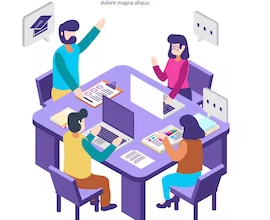Improving Student and Staff Knowledge Management with a School ERP
Improving Student and Staff Knowledge Management with a School ERP
Education has always been a dynamic sector, with constant changes in curriculum, technology, and teaching methods. As a result, educational institutions such as schools and universities are often faced with the challenge of managing large amounts of data, including student records, class schedules, exam results, and faculty information. To meet these challenges, many educational institutions are now turning to School ERP (Enterprise Resource Planning) systems. School ERP is a comprehensive management software that provides an integrated solution to manage all aspects of school operations.
One of the most significant benefits of a School ERP system is that it improves knowledge management for both students and staff. Here are some of the ways in which a School ERP system can help in this regard.
Centralized Database: School ERP systems provide a centralized database that stores all information related to the school's operations. This includes student records, faculty information, financial records, and other administrative data. Having all this information in one place makes it easier for both students and staff to access the data they need. They no longer have to go through multiple files and folders to find the information they are looking for.
Better Collaboration: School ERP systems also improve collaboration between students and staff. For example, students can use the system to communicate with their teachers, submit assignments, and access study materials. On the other hand, teachers can use the system to post announcements, share class schedules, and update grades. This results in a more streamlined and efficient learning environment, where everyone is on the same page.
Access to Information: With a School ERP system, students and staff can access information from anywhere, at any time. They can log in to the system from their computer or mobile device and get the information they need. This is especially useful for students who need to access course materials or assignments outside of school hours. It also helps teachers stay organized and informed, even when they are away from the classroom.
Personalized Learning: School ERP systems also enable personalized learning for students. They can use the system to track their progress, access learning materials, and get feedback from teachers. This personalized approach to learning helps students to stay engaged and motivated, and it also allows teachers to identify areas where students may need extra help.
Data Analysis: Finally, School ERP systems provide powerful data analysis tools that can help educators to make better decisions. They can use the system to analyze student performance data, track attendance, and identify areas where students may be struggling. This information can be used to improve teaching methods and student outcomes.
In conclusion, School ERP systems are transforming the way educational institutions manage their operations. By providing a centralized database, improving collaboration, providing access to information, enabling personalized learning, and offering data analysis tools, they are helping to improve knowledge management for both students and staff. With these benefits, it's no surprise that more and more educational institutions are adopting School ERP systems to improve their operations and enhance learning outcomes.
#improving#student#staff#knowledgemanagement#schoolerp#schoolingkey




Comments
Post a Comment